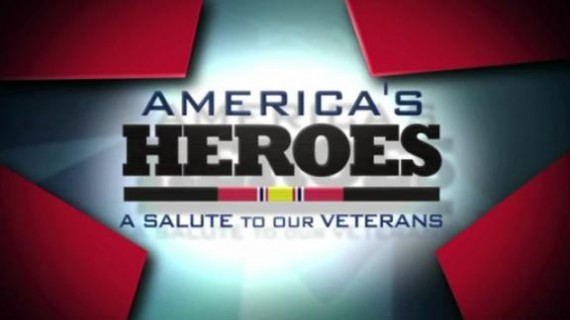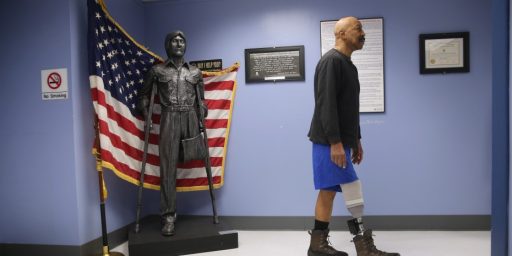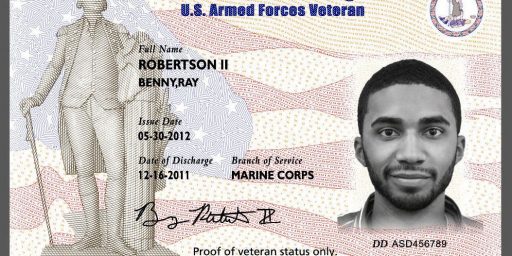Veterans Write Shitty Novels, Too
It's okay to criticize military veterans--even if you never served in the military.
Michael Larson urges, “Stop giving war-veteran novelists a free pass.”
One of the most feted books of the season is a debut novel about the Iraq war, Kevin Powers’ “The Yellow Birds.” It has garnered gushing blurbs from famous authors, the cover of the New York Times Book Review, a National Book Award nomination, TV appearances, the Guardian First Book Award, and laudatory reviews from nearly every corner of the literary establishment. And this past weekend it added aNew York Times Best Book of 2012 to the list. By general consensus, “The Yellow Birds” is a classic of war literature.
There’s just one little problem: The novel doesn’t measure up to the praise.
Indeed, the book is beset by so many deficiencies you’re tempted to wonder what the critics have been smoking. The answer, in the words of one veteran friend, is Martialuana. Let me define the term I’ve coined: It’s a stimulant, known to effect in its user a long-lasting, sometimes undeserved, high about American armed service members and veterans. Prevalent in establishment circles. Often used to assuage guilt for the burden veterans have borne over the last decade.
Veterans have benefited greatly over the last decade from the widespread use of this very legal drug. No government institution is more respected than the armed services, according to Gallup, and veterans as a constituency have become virtually untouchable. In corporate marketing parlance, “Hero” has become the stock term for anything that has to do with veterans. It’s hard to go a week without stumbling across the latest “Hero Summit”‘ or “Hero Pass” or “[Insert Big Corporate Name] Salutes Our Heroes.” For those of us who have worn the uniform — I served as an officer in the U.S. Navy — the ubiquity of the label is laughable. Audie Murphy is a hero; Joe Soldier only one in his mind.
Let me confess at the outset that I’ve not only not read “The Yellow Birds” I wasn’t even aware that it existed, much less was being feted by literary critics. Further, I don’t really care much about the opinions of professional critics, whose tastes in music, literature, and food often differ radically from my own. But giving war-veteran novelists a free pass is merely a subset of giving veterans a free pass more generally, a pet peeve of mine for years.
Brandon Friedman, a former official with the Department of Veterans Affairs and an Infantry veteran of the wars in Afghanistan and Iraq, pointed approvingly to the piece on Twitter, prompting Jonathan Rue, a Marine veteran, to observe, “It’s not surprising I suppose, but have you noticed that the only people willing to criticize veterans are… veterans?” Indeed, Larson is a former US Navy officer and, for those who aren’t regulars here, I’m a former Army field artillery officer and veteran of the first Gulf War.
As Rue acknowledges later in the conversation, the reasons for this are pretty obvious. Because we’ve been on a war footing for so long and because such a small part of our population serves in the military, much less combat, there’s a reluctance to speak out against those who have. Beyond that, as I’ve argued for years, we’ve over-corrected as a society from the vilification of returning Vietnam vets to the notion that everyone who’s ever served in any capacity is a “hero.” Those of us who’ve served, by contrast, tend to reserve that term for those who’ve exhibited remarkable valor under fire–especially those who do so while already wounded or to save the lives of their fellow troopers.
As Joshua Foust notes, ”most novels are bad anyway. No surprise most veteran novels would be as well.” And it’s okay to point it out when they are.







Veterans issues lobbyists are always much happier to lobby non-veterans than veterans, the latter group being perfectly willing to call bullsh!t whereas the former is often overly deferential.
This is a stance with which I totally agree. As I wrote in my blog on Veteran’s Day,
I served during the Viet Nam conflict. I can’t help but think this current near deification of every member of the military, past and present, is a result of our national guilt over how veterans were treated in the 60s and 70s.
This is mostly a myth.
True. I’d like to recommend Richard Galli’s “Of Rice and Men.” No blood, no gore, but a good summation or Viet Nam. If nothing else read the chapter entitled “Muddy Boots.”
One name……Norman Mailer
As de stijl also noted, this is largely a myth. There was no large-scale vilification of Vietnam vets by the public upon their return, certainly nothing like the stereotype of soldiers being spit on or called baby-killers. Returning veterans did often feel that they weren’t appreciated, but that had more to do with the public’s recognition that the entire Vietnam War was kind of a shameful mess, not with their feelings about the veterans personally.
There’s too much good non-fiction like Sledgehammer’s With the Old Breed, We Were Soldiers Once, a new series of Korean conflict books at the tactical level (talk about freaky – massed Chinese banzai tactics…and US banzai tactics!?), etc etc [include everything by Keegan here> <], and Sorley's two books about Ridgeway and Westmoreland to bother with fiction IMO. The exception would be The Forever War but that's SF…
@Jack Carlson:
is a result of our national guilt over how veterans were treated in the 60s and 70s.
Like De Stijl I think this is something of a myth. And the deification has nothing to do Vietnam or guilt, the US has been puffing the military during wartime since time immemorial. Usually for reasons of domestic politics. This most particularly applies to senior officers of dubious competence and judgement……Franks? Odierno? Sanchez? Casey? McChrystal? Petraeus? Schwartzkopf? To be fair I’d give a couple of these passing grades but none of them were the second coming of Manstein or Zhukov.
Norman Mailer– ? Yes, because WWII was when a large portion of the male population was serving. So, the occasional brilliant, outstanding mind was in uniform. This is not the case today, clearly, when the military is filled with legacies.
Agree with the post. Many veterans are jerks, not heros.
@Jack Carlson: @de stijl: @Brummagem Joe: I too served during the Vietnam war(1968-1971). I returned to the hotbed of antiwar activity, the West Coast, and never saw it.
This is not a novel but an excellent piece of non fiction written by an Iraqi war vet.
Kaboom: Embracing The Suck In A Savage Little War
@John Peabody:
Actually I think Mailer was a bit of a jerk. He wrote a couple of good novels and a lot of awful ones. I believe he saw combat but was a cook.
@Ron Beasley:
I returned to the hotbed of antiwar activity, the West Coast, and never saw it.
Neither did I. The whole thing was largely a media invention feeding off bad luck stories by rather angry people. The entire MIA construct fell into the same category. Despite numerous missions dismissing it, including one in which McCain was involved, there are still people out there claiming it’s all true. We love our fairy stories in the US.
Is Tsar Nick posting under JJ’s name? “I’ve never heard of this hugely praised book, but someone at a site famous for link trolling says it’s bad, so I’m going to condemn both the book and those who have given it awards.”
Also too, its a cheap way of establishing your patriotic bona fides. If you are a wealthy businessman who avoided the draft earlier by taking deferments and whose children did not serve, then one way to establish that you are more patriotic than thou is to be super militaristic and to all “We support our troops”.
Finally, there is the guilt factor. Just why are people serving in the military, and re upping again and again? Some purely for God and country sure, but a lot for the usual economic reasons-because they got a girl pregnant and they had to provide for her, or because its the only way out of a dead end job or a dead end town or slum or because some judge somewhere gave them a choice between jail and the ranks.
People who do avoid service because of their better economic options naturally feel guilty because of this and so they overpraise those who have to serve.
@stonetools:
Just why are people serving in the military
Some of the reasons are economic of course but if you’re in your early 20’s and full of piss and vinegar it can be quite exciting while at the same time curiously secure for much of time.
@Wr: Not sure what your point is. I’m saying that I have no opinion as to whether this book is good but am using Larson’s column to start a conversation about the larger issue at hand.
I’d read the praise for Yellow Birds, so I picked it up a the library when I saw it on the new arrivals shelf. I always read a page or two before checking a book out–this one just didn’t grab me. Also, I wasn’t in the mood for a “downer” book.
I’m mildly curious, so may yet check it out. But I won’t be buying it.
@James Joyner: your entire post is premised on the idea tha this critic is right. I don’t actually disagree about our national sentmentalization of vets, but from your title on you spread some link whore’s assertion that the only reason people like this book is because they, unlike him and only him, make their aesthetic judgments based only on a narcissistic desire to look good.
@James Joyner:
Thanks for raising the topic. Interesting Twitter conversation too. Would be interested in a list of fiction and nonfiction on war that you would recommend.
Also too, there have been great literature about war and the military written by people who never served. (Rudyard Kipling , for example). As always, the key to writing great literature of any kind is to be a great writer.
Good nonfiction book about the Iraq War :
Generation Kill , Evan Wright.
This was made into an HBO miniseries, available on DVD.
One of the protagonists, Nathaniel Fick , wrote on his own book on his service after 9/11.
One Bullet Away: The Making of a Marine Officer
I recommend that too.
@stonetools: Love the idea. My recommendation for non-fiction on war: A Man Called Intrepid by William Stevenson (WWII) and Charlie Wilson’s War (the book).
Two I liked, lite sarcastic reads.
We Meant Well
Blood Makes the Grass Grow Green
@Scott O: Some would say the best war book of them all is Catch-22….
Somewhat like the (SF) Retief books by Keith Laumer, who did work in the diplomatic service for many years. Most of Laumer’s characters are obsequious little incompetent toadies. Makes you wonder how many of them are based on actual individuals. It’s usually only someone who has really experienced the system who can satirize it properly.